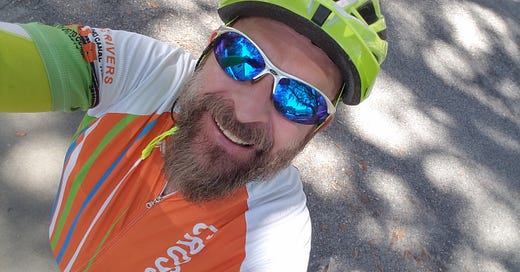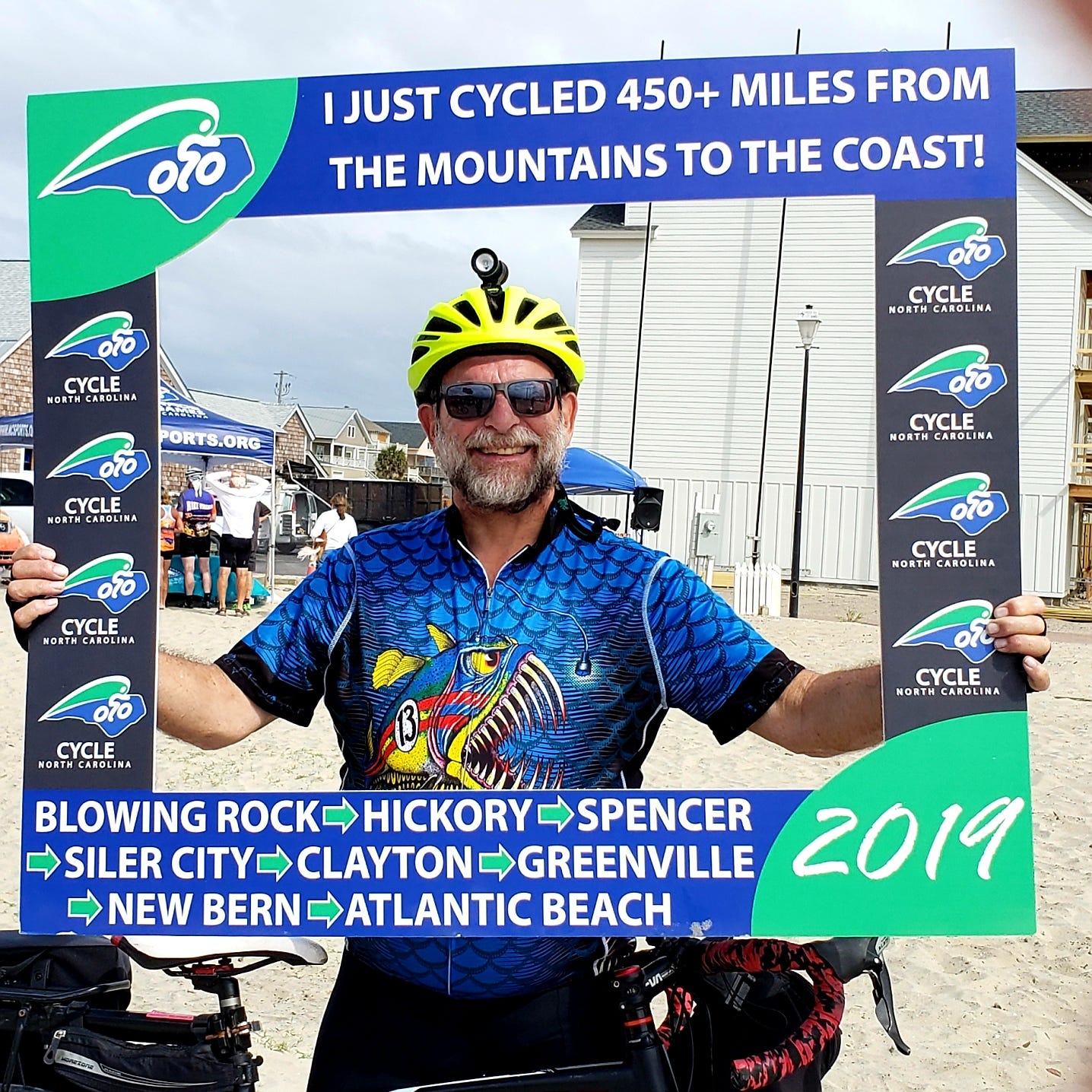Five later in life lessons I learned from bikes and trails
Why this 70-year-old is dedicated to trails, cycling, and advocating for a healthier and happier life on a bike.
It's been almost eight years since I retired from my IT career. The newfound freedom left me wondering what I would fill my days with.
A work colleague gave me 'How to Retire Happy, Wild, and Free,' likely due to the cover featuring a horse riding a bicycle. I read it on my first days of retirement and found it quite informative. The author's key message was that a successful retirement requires structure, passion, and community. I dedicated to living my days with that in mind.
A retired colleague gave me some valuable advice as I approached retirement. During the first six months of retirement, I should focus on doing whatever I've always wanted to do but couldn't because of work. He said it helped him discover what joy in retirement should be.
Following his suggestions, I spent the first six months of retirement cycling, touring by bike, and exploring trails. Cycling became a daily routine, and I cycled six bike tours, including several week-long or long weekend trips.

Birth of my trail advocacy
The only thing undecided was how I would be involved with trails. My local trail, Heart of Ohio Trail, was looking for a board member. With my background in nonprofit leadership and experiences in event management and communications, I felt I could make an impact with my talents. I accepted the board position as the treasurer.
One of my initial retirement adventures was a week-long tour on the Ohio to Erie Trail. I participated in their annual ride and thoroughly enjoyed the experience. I met good trail people and formed new friendships. Two years later, I returned for another tour of the trail. After that tour, I was asked to join the Ohio to Erie Trail board of directors.
I settled into the role working on marketing and communications for the trail. I enjoyed this work. In my first year, the marketing chair stepped down and became the board secretary. This allowed me to move into leading the marketing team.
In 2022, I was asked to assume the role of president of the organization. As usual, I raised my hand, something I do far too often. I knew my skills would be a good fit for the position. I've now been president of the trail for two years.
Five Live lessons from the bike
In the fall of 2019, my friend Greg invited me to join him on the North Carolina Mountains to Coast Ride. I was hesitant being not a strong hill climber and preferring to avoid rides with 3,000 - 4,000 feet of elevation in 70-mile days. However, I caved in and registered. I told Greg, 'If I die on this, it's your fault!
After completing the Mountains to Coast ride, I shared my experiences in a blog post, 'Five Things I Learned from the Mountains to Coast.' Revisiting the post and the five insights, I realized they could help explain why this old guy is president of a trail organization and enthusiastic about cycling, bike touring, and advocating for trails.
1. Life is about having fun.
As I neared retirement, I was drawn to the joy of cycling, bicycle touring, and advocacy. Cycling and touring by bike were central to bringing fun to my life. As in my younger days, laughter and fun times are key to a healthy happy life. Think of fun as the secret ingredient to a fulfilling life.
Fun enriches life. In my retirement years, I am more deliberate in pursuing enjoyable activities. There are times when fun comes my way unexpectedly. Fun happens and that is good!
2. Don’t give up on the challenge.
The 2019 Mountains to the Coast Ride was a tough challenge, but I came out the other side stronger. It was an incredible adventure filled with unforgettable moments making me more energized and positive about life.
It's easy to fall into a routine, especially when you retire. But I've discovered that stepping outside your comfort zone, whether it's through physical activity, mental challenges, or new social experiences, can lead to personal growth. These challenges contribute to my leadership style and abilities.
3. Embrace your age.
This personal growth also contributes to my leadership abilities. As I've gotten older, I've realized the importance of being active and engaged. When I think of my grandparents at 70, they seemed much less energetic and involved than I am now.
Everyone's journey through aging is different. For me, it's about being active in my community and encouraging others. This has been my mission since overcoming health challenges and losing weight. I believe it's never too late to share my experiences of growth and change from the years leading up to my retirement.
4. Age is only a number.
Age is just a number. People dread reaching milestones like 30, 40, 50, and beyond. But the reality is age doesn't define you. You define who you are by what you do.
I proudly embrace being 70. I'm in a much better place than I ever imagined at 52, recovering from a triple bypass in the ICU. I learned that the key to life is to live each year to the fullest. I'm determined to make my 70th year the best it can be, aiming for it to be one of the most memorable years of my life.
5. You are never too old to learn.
Over my years in corporate America, I participated in various personality assessments. One of the most insightful was the StrengthsFinder assessment. It identified my top five strengths: strategic, analytical, communication, relater, and learner. I was surprised by the inclusion of 'learner' in the top 5.
When I took on the role of president of the Ohio to Erie Trail, a position I'd held in various church councils, nonprofits, and advocacy organizations, it felt like a new challenge, unlike other presidencies. I questioned my ability to lead the organization.
I needed to learn from others. I started by interviewing my board members and executive director. I wanted to understand their expectations of me and their vision for needs and the future of the trail. I reflected on my past leadership roles and adjusted my leadership approach to meet the needs of my fellow board members and the trail.
A crucial aspect of learning that people often overlook is learning from experiences. While acquiring new knowledge is important, reflecting on past successes and failures can be equally valuable. Learning from mistakes helps prevent repeating them while learning from successes can identify commonalities to take on current challenges.
Never stop learning, because life never stops teaching. - Tea and Toast







Fave post so far, Tom! And you certainly have teed off retirement well. That last quote is 💯
Awesome advice Tom